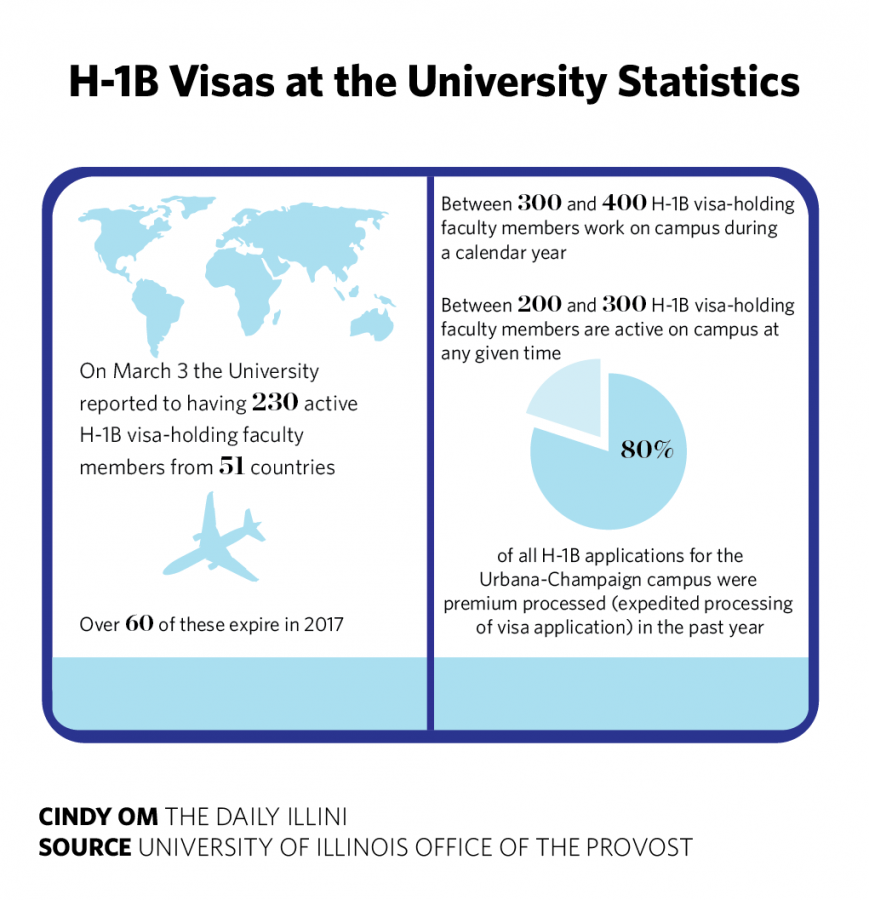US suspends expedited processing for H-1B work visas; University endures repercussions
April 17, 2017
University job positions may be empty starting this fall as the United States government has issued a temporary suspension of expedited application processing for H-1B visas, which allow skilled foreigners to work for companies and institutions within the country.
This expedited processing, referred to as “premium processing,” allowed U.S. businesses and institutions such as the University to quicken the application processing time of an H-1B visa by paying an additional $1,225.
The University reported that premium processing was used for 80 percent of the H-1B applications filed last year, and that 300 to 400 H-1B visa-holding faculty members work on campus during a calendar year, with between 200 and 300 active at any given time.
“(Premium processing) has been utilized heavily by this University,” said Chancellor Robert Jones at an Academic Senate meeting on April 3. “Our greatest concern is the impact that it will have on this University community if it prevents us from being able to get visas approved, so that members of our community that were planning to join us in the fall will continue to do so.”
The Office of the Provost says the United States Citizenship and Immigration Services created a process by which premium processing is “almost mandatory.”
Get The Daily Illini in your inbox!
Premium processing would require United States Citizenship and Immigration Services to take action on an H-1B application within 15 days of it being received.
This then results in a shortened one-and-a-half- to four-and-a-half-month timeline, starting from when a University department informs International Student and Scholar Services that it wishes to hire an international faculty member. The timeline ends when the United States Citizenship and Immigration Services takes action on the H-1B application filed and sent by the International Student and Scholar Services.
With premium processing off the table, H-1B applications not submitted by April 3 — the suspension’s starting date — will have to wait seven to eight months through standard processing before the application can be approved.
International faculty members who were expected to start in August or before will not be able to work at the University until November at the earliest, if their H-1B applications were not sent to the United States Citizenship and Immigration Services by the suspension’s starting date.
Employers are required to submit a Labor Condition Application from the Department of Labor along with their H-1B application, which is used to prevent employers from exploiting outsourced employees.
Labor Condition Applications; however, cannot be issued until six months prior to an employee’s expected job start date, thus giving a maximum six-month window between when the University can actually file an H-1B application and when a job candidate is anticipated to start working.
Due to this intrinsic time constraint, the Office of the Provost says that it is “almost impossible” to have an H-1B employee start on time without expedited processing.
“It’s not business as usual, unfortunately,” said Director of International Student and Scholar Services Martin McFarlane.
Prior to the suspension of premium processing, McFarlane said, International Student and Scholar Services tried to process “an awful lot” of H-1B applications to secure as many prospective international faculty members as possible before the deadline.
Since then, he and members of both the University’s legal counsel and the Provost’s Office have been holding Q&A-format discussions for departments around campus to discuss the effects of the suspension, and alternative visas possibly available for their international job candidates.
“It’s going to be individual situations that we will be looking at,” he said. “And unfortunately, for some of them we will have to say (to the departments), ‘They do not qualify for any visa at the moment,’ because we can’t get an H-1B in time.”
McFarlane said that University departments and colleges will then have to make a decision to either delay hires and find a way to fill job positions until candidates’ H-1B come into effect, or seek other options.
“The University is just reacting as best as we can,” McFarlane said. “We are strongly encouraging departments and colleges not to let this factor into their hiring decisions. Identify the best person, then we’ll look at other options.”
United States Citizenship and Immigration Services’ self-imposed suspension was reasoned as being a way to reduce the amount of regular H-1B applications backlogged due to the large influx and obligatory prioritization of premium processed applications.
The suspension may last up to six months, and United States Citizenship and Immigration Services says it hopes to ultimately reduce the overall length of time it takes to process an application under regular processing.
“It actually makes a lot of sense (the suspension),” McFarlane said. “It’s just, we had hoped (as an institution) … that there would be an exception; unfortunately, that has proved not to be the case.”







